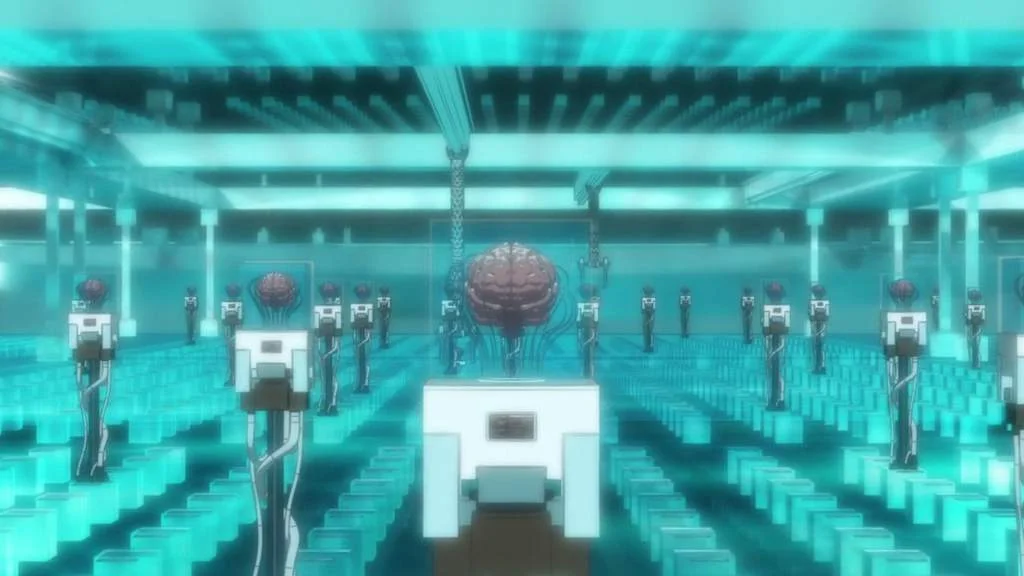I finally got down to watching this show after several recommendations and I got to say, it was eerie how familiar some of the themes and concepts were to real life occurrences. With that said, I’ll begin by breaking down the basic plot of this cyberpunk anime, but be forewarned that there are some spoilers ahead. Got it? Good. Let’s continue.
Now the story of Psycho-Pass is set in a futuristic Japan where their society is essentially run by a supercomputer called the Sybil System: a powerful network of psychometric scanners that actively measures the minds and mentalities of people using a "cymatic scan" of the brain. The resulting assessment is referred to as a Psycho-Pass. When the calculated likelihood of an individual committing a crime, measured by the Crime Coefficient index, exceeds an accepted threshold set by the Sybil System, the person in violation is pursued, apprehended, and killed if necessary by police forces.
The police forces are divided into two main categories: Inspectors and Enforcers. Inspectors are elite officers who supervise Enforcers, both of which are equipped with cutting-edge handguns called Dominators—special weapons that only activate when aimed at suspects with higher-than-acceptable Crime Coefficients. Enforcers are sometimes derogatorily called “Hounds” and are selected based on their innately high Crime Coefficients, marking them as "latent criminals." Should an Enforcer ever be deemed a threat to society, an Inspector can choose to neutralize them via Dominator.
Inspector Akane Tsunemori, the main character of Psycho-Pass
Unfortunately, there are many downsides to running a society based solely on the Sybil System as the system itself cannot distinguish the subtle nuances that affect a person’s Crime Coefficient or take into account that there are variables and exceptions to the rule. For example, in the first episode, a female victim who is hysterical due to almost being raped has a huge spike in her Crime Coefficent in a short time span, and as a result, is almost killed by an Enforcer. Luckily, Inspector Akane was able to deduce that it was her irrational that caused the sudden spike and the woman was spared in the nick of time.
Another example that comes to mind is the case of Shogo Makashima,the main antagonist of the series who is asymptomatic and thus his Psycho-Pass does not register as a threat under Sybil System’s scanners. Though his intentions are noble in the sense that he wants to free the world of control by the system and bring back freedom of choice and action, his methods are extremely manipulative and diabolical. For all intents and purposes, the man should be instantly eliminated for his crimes, but without his Crime Coefficient reacting normally like others, this causes him to believe that his sadistic plans and machinations are actually morally justified ends to a means.
Strangely, Psycho-Pass came out in 2012 and it tells a cyberpunk story that parallels a very real program being implemented in China two years later, the Social Credit System.
The Sybil System
The Communist Party unveiled Social Credit System which came into action in 2014. This is 2 years after the release of Psycho-Pass. The Social Credit System is much like the Sybil System as it places security above everything else and imposes invasive breaches of privacy. Social Credit acts like a personal scorecard for each of China’s 1.4 billion citizens.
Trial social credit systems are now in various stages of development in at least a dozen cities across China. The programs that are already in place give each citizen assigned a score out of 800. In other regions the programs scores out of 900. Kind of like the Crime Coefficients in the Sybil System, which uses a benchmark of 100 and ranks anything over the 150 mark as dangerous territory.
Those who comply with the system and strive to be good upstanding citizens will get VIP treatment at hotels and airports, cheap loans, and are set on the fast track to the best universities and jobs. Those who underperform can be locked out of society and blacklisted from the community. Infringes are typically result in things like being banned from travel, or barred from getting credit, or landing a job. A simple Google search can bring up a litany of examples of those who follow the system and the hardships of those who sought to fight back only to receive quick reprisal.
Unfortunately there are no such things as “cymatic scanners” in 2018. However, with 200 million cameras all over the country pointed in your every direction, it pretty much functions as the next best thing. The Social Credit System will be using these cameras to enforce the latest in high-tech surveillance systems as China is poised to become the world leader in A.I., or artificial intelligence.
These surveillance cameras will be equipped to detect everything from facial recognition, body scanning, and geo-tracking to provide a nonstop watch over each and every citizen. Smartphone apps will be utilized to collect data and monitor online behavior on a routine basis. From there, the data from more traditional sources like government records, including educational and medical, state security assessments and financial records, will be fed into individual scores.
Several companies are already working with the state to nationalize the system, coordinate and configure the technology, and finalise the algorithms that will determine the national citizen score. It will likely go down in history as one of the grandest social engineering projects ever attempted—a way to control and coerce more than a billion people. So as long as you follow and act accordingly, you will continue to be rewarded. But what happens if a person acts out for their own interest? Thankfully, those of us in free nations won’t have to worry about that yet.
So did Psycho-Pass predict the Social Credit System with the Sybil System? Perhaps. Or perhaps it was just a coincidence. What remains to be seen is how successful this program will be in China and what effects it will have on a much larger scale. Predictions are that by 2020 the system will be fully operational. And if successful, it will become the world’s first digital dictatorship.



